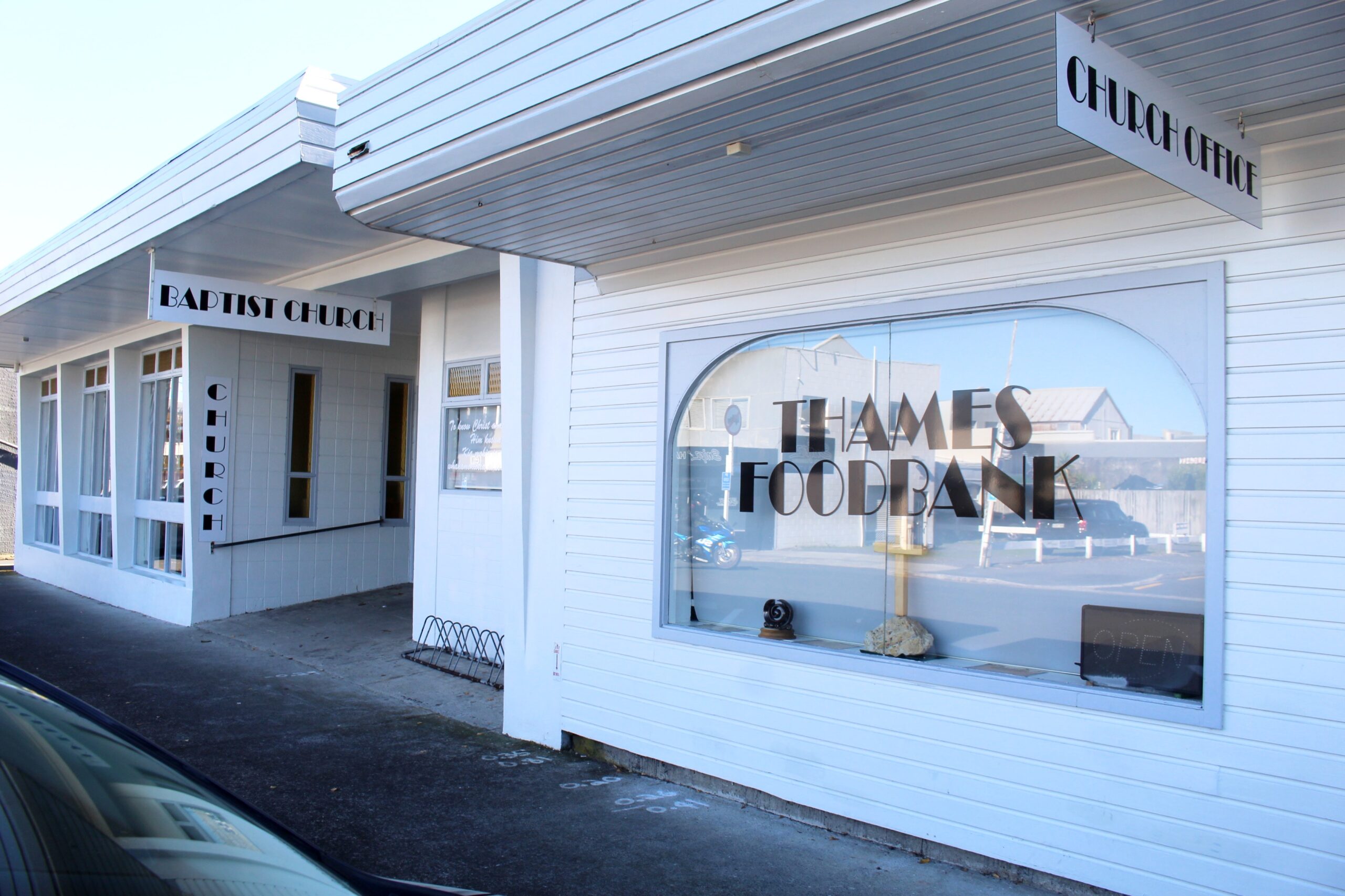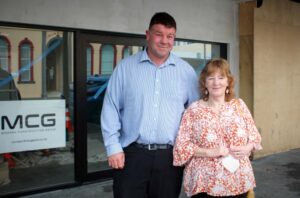For the month of March, 395 people utilised the open door policy of Thames Baptist Church, but their presence caused concern among workers in the CBD. As part of an ongoing series about the impact of living rough in Thames, KELLEY TANTAU seeks out what support is offered.
They call it the ‘305’.
It’s a safe place to get free food and hot drinks, to shelter from the rain or the wind, and for some people, have a semblance of a home.
It’s known by the three numbers for its location along Mary St – The Thames Baptist Church and its adjoining food bank – and the past two months have seen more than 730 visits by people in need.
Not all are homeless. Some are hungry, while others seek security.
But due to the location of the 305 – in central Thames – concerns have been raised on social media about the “aggression and intimidation” that spills out of the baptist church and into public areas such as Pollen St, The Vibe, and Goldfields Shopping Centre.

People said they have also witnessed “almost daily” intoxication and drug use.
“Our customers get abused, they get sworn at… while sitting in their cars, people come and ask them for money and intimidate and scare them,” one worker said. “Sometimes they walk in drunk. It’s been going on for years but it’s just getting worse.”
On a Tuesday morning, The Profile spoke to businesses and staff along Pollen and Mary Sts, and while they each respected the goodwill of the baptist church, they raised concerns over its locale.
“Monday to Thursday from 9am-12, that’s when we have problems. They yell and scream at each other. They congregate at [the church] and then they go to The Vibe and congregate there.
“Sometimes they are all good and they’re not a problem, and other times it’s just horrendous.”
The Profile earlier reported that up to a dozen people had been living rough at Danby Field, adjacent to Porritt Park Playground and Goldfields Mall.
One of the residents living in a tent within the mangroves said that each morning, they head to the Thames Baptist Church and have breakfast. They stay there until midday.
The church offers ‘Tasty Tuesday’ – a community meal – and it also provides them with food parcels.
The church was a big help, the resident said.
But those living rough also admitted to stealing and suffering from alcoholism, and complaints from workers with a “vantage point” of the conflicts included witnessing “almost daily” intoxication and drug use.
“Our biggest concern is that the behaviour is not being addressed. Maybe all it would take is feet on the ground,” another staffer – who The Profile agreed to keep anonymous – said.
“I’ve seen [police] cars cruise literally past drug use… and I know resources are so stretched but it really does seem like a blind eye has been turned.
“Thames battles as it is to create itself as a destination, and then if people do come, this is the vibe that they’re seeing… I would probably say ‘I don’t need to come back to that town’ if I was passing through.”
The worker said they were concerned about the antisocial behaviour and how it was impacting the general public, but they were aware there was a “high-needs group” that needed support.
“But maybe it’s the community that isn’t receiving the support?” they said.
“I’m sure if you and I went over and cracked a box of Woodies, someone would come and say something. If we started smoking a P pipe over there, I’m sure someone would say: ‘This is not okay’. But it doesn’t seem like there’s any kind of consequence for that particular group, and maybe it’s just because it’s a problem that’s becoming larger and more uncontrollable, I don’t know.”
Chris Lee is the current and 30th pastor of the baptist church in Thames.
He has seen first-hand the need within the community, and “for years” he has tried to find a solution for the homeless situation.
He told The Profile he was aware of the concern of some shop owners in Mary and Pollen streets, and one time, the church was even called to the office of a former mayor and was asked why it didn’t shift locations.
“We declined, saying we have been here for 150 years,” Chris said. “And according to one of our elder ladies, complaints about what we do for the poor and disadvantaged here have been ongoing for well over 20 years.”
The community ministries arm of the church, under the banner of the Living Well Trust, tries to meet the needs of the poor, and in March, there were 395 people through the church doors: 278 Māori, and 117 European.
Fifty food parcels feeding 175 people – 87 adults and 88 children – were distributed, while over three weeks, 71 people took up the offer of the church’s Tasty Tuesday.
These numbers were slightly reduced for the month of April.
Chris said homeless people in Thames were either living in the bush or the mangroves, living in their cars or on boats, or living in substandard accommodation on whanau land. Others were squatting or couch surfing, while some chose to live homeless, even if options existed for them to be housed.
But not all people labelled “homeless” by the community were actually homeless, he said, and from the church’s record of verbal incidents, most were caused by homed people and by repeat offenders.
Because of the social media comments, the church has been recording the number of incidents outside and inside the 305. In April, there were two incidents outside and two inside, and in May, there has so far been just two inside.
However, Chris said disorder was not tolerated on the church premises, and any verbal altercations on the footpath outside would try to be quelled by intervening and mediating.
“However, we have no jurisdiction in the public place,” he said.
“Police are called by us if it will not settle, as they have the jurisdiction there, and normally the protagonists are well-known.”
He also said the church had no jurisdiction over people’s actions or behaviours in The Vibe.
“Some of the people – not necessarily the homeless – have dogs which they bring into town and tie up outside whilst they come in for breakfast, and Dog Control has visited about the behaviour of some of those dogs. But as I said, we have no jurisdiction on the footpath, and we have no land which is not on the footpath for people to tie up their dogs. Their dogs are their whānau,” Chris said.
Thames-Coromandel Mayor Len Salt said his council talked to the Ministry of Social Development and NZ Police on a regular basis, and that as the council moves into its recovery phase following the recent storm events, they will also begin to “fill the gaps” and help and support the community in a way it’s “not had the capacity to do before”.
This means working with businesses and locals about the issues facing them.
“The agencies are very much aware of the individual people involved out there who are vulnerable, and their vulnerability causes them to exhibit behaviours which are challenging in the community – we’re aware of that,” he said.
“There has to be a collaborative approach. If people say council is the beginning and the end of the answer to the problem, then we’re not only missing an opportunity, but we’re also missing the valuable input we need from the people who live and work in those spaces.”
Meanwhile, NZ Police acting senior sergeant Niwha Jones reaffirmed Police’s support with the district council and Kainga Ora.
He said Police take enforcement action when required, including arrests and issuing liquor ban infringement notices.
“Rough sleeping, begging or being homeless are in themselves not criminal offences, but Police are called from time to time to deal with issues around matters involving public disorder or complaints about antisocial behaviour.
“Many of those dealt with are suffering a wide range of welfare issues, and Police will seek to use alternative resolutions and referrals to partner agencies to assist with specialist help.
“We aim to engage, educate, encourage and learn from all interactions. On occasions, we will exhaust all options and have no alternative but to take enforcement action.”
Niwha said Police were continuing to work alongside, and have meetings with, its partner agencies to better understand the issues and to find long-term solutions for homelessness.
He said anyone who sees illegal activity should call 111 immediately, or 105 if it’s after the fact.
BY KELLEY TANTAU





